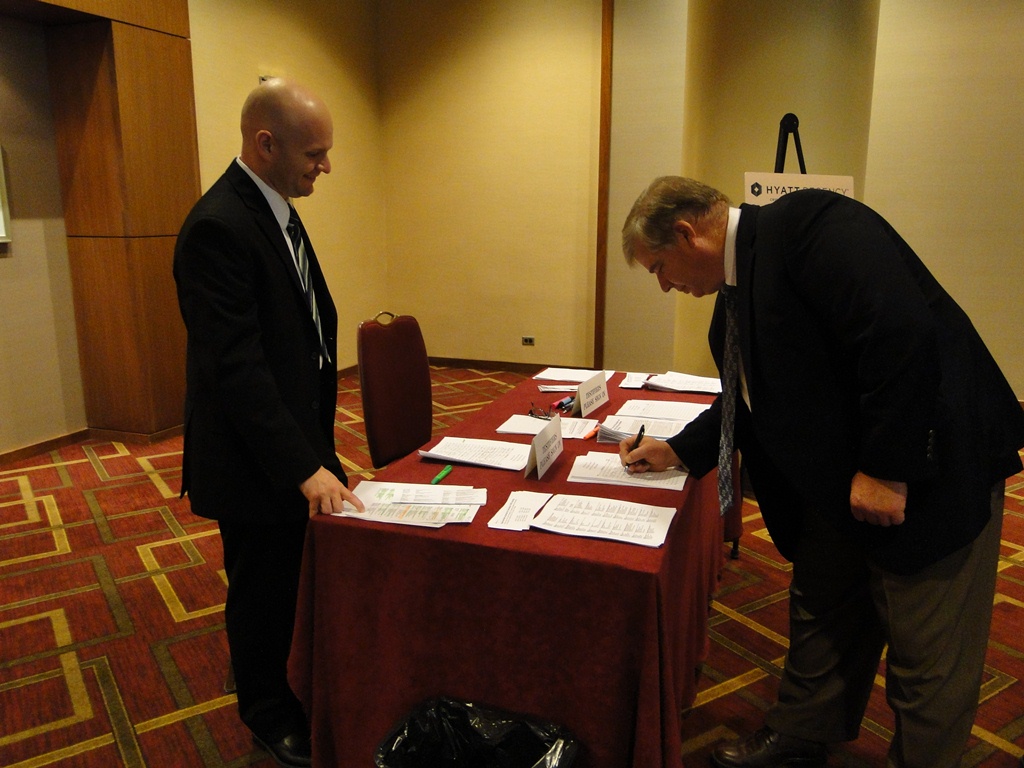Missouri Growers Defend Ethanol In EPA Hearing
(JEFFERSON CITY, Mo.)–Missouri corn, cattle and ethanol producers traveled to Washington, D.C., yesterday to testify during an Environmental Protection Agency (EPA) hearing on the proposed 2014 Renewable Fuel Standard (RFS) rule. Released Nov. 15, the proposal would reduce conventional biofuel requirements, mostly sourced from corn-based ethanol, from the statutorily required 14.4 billion gallons to 13 billion gallons.
The Missouri delegation’s message: Don’t Mess With the RFS.
“In my area of the world, homegrown renewable fuels have not just helped the agricultural economy, but given us a new sense of prosperity,” Missouri Corn Growers Association Board Member Jay Schutte, a corn and livestock farmer from Benton City, Mo., said in his testimony. “I am here today to ask that the RFS be kept in place and that the volume levels that were first put in place be kept.”
Adopted by Congress in 2005 and expanded in 2007, the RFS calls for increasing amounts of low carbon renewable fuel to be blended into our nation’s fuel supply over time, reaching 15 billion gallons by 2015. The RFS was designed to reduce dependence on foreign oil and increase the nation’s renewable fuel supply. This proposed reduction would put 2014 requirements below 2013 levels and reduce demand for corn by nearly 500 million bushels.
“I could be working on the farm today, but thought it was more important to come to Washington, D.C., because I support ethanol and have seen how important the RFS is to all of agriculture and to America,” Dwayne Schad, a corn and livestock producer from Versailles, Mo., said during his testimony. “Reducing the demand for corn in a record crop year will have a devastating impact on our communities.”
Reduced demand for ethanol could also affect Missouri’s six farmer-owned ethanol plants.
“While Show Me Ethanol provides employment to 38 individuals, the number of families dependent on our production is much greater,” testified Rich Hanson, Show Me Ethanol general manager. “The local truck drivers moving products to and from our facility, and the employees of the local elevator supplying our corn, as well as all the farm families in the area that grow corn to support our production all depend on us to help provide a livelihood in rural Missouri.”
Hanson continued, “Not only does ethanol lower the cost of fuel consumed by each of us in our daily transportation, it also provides price support for the agricultural economy that is the heart and soul of the United States. The EPA did a wonderful thing by putting in place the RFS, reducing the dependence on foreign oil and providing an opportunity for a clean domestic renewable fuel source. By taking a step backward, you are sending a signal that the government no longer supports the production of biofuels. Making changes to the mandated volumes takes away incentive for business such as ours to expand and will create challenges for some to even continue operating.”
Missouri’s delegation also noted the potential impact on consumers if levels are dropped to 13 billion gallons.
“I sit on the board of a local bank and have seen the rural revitalization occurring in our area due to ethanol production,” noted David Durham of Norborne, Mo. “Better paying jobs at the plants, more jobs in the suppliers to the plants and more retail businesses. In this tight economy, we also see more people coming in to borrow money just to pay their heating or electricity bill. These are the people who will suffer the most when they have to pay 40-50 cents per gallon more to fill up their car because it is not blended fuel.”
Other individuals and groups testifying in the over 12-hour hearing included: Iowa Gov. Terry Branstad, the Renewable Fuels Association, Growth Energy, National Biodiesel Board, American Petroleum Institute, Biotechnology Industry Organization and the American Coalition for Ethanol. The National Corn Growers Association, along with corn growers from 12 other state corn associations also weighed in. A final rule from the EPA is expected in February. The Missouri Corn Growers Association will remain engaged and continue fighting to ensure requirements are restored to their intended levels.
Learn more about the importance of ethanol to Missouri and tell the EPA, “Don’t Mess With the RFS,” at http://cattleandcorn.org/.
Downloadable media assets for this article:
Right-click the link and choose "Save as." Captions for the photos are provided.
Photo Downloads

Photo Caption: Corn, cattle and ethanol producers from Missouri testified during an Environmental Protection Agency (EPA) hearing Dec. 5 in Washington, D.C., in support of ethanol and the federal Renewable Fuel Standard. The hearing was held to discuss the recent EPA proposal to cut 2014 biofuel requirement levels. Pictured (l-r) Jay Schutte, Missouri Corn board member from Benton City, Mo.; Rich Hanson, Show Me Ethanol general manager; Dwayne Schad, a cattle and corn farmer from Versailles, Mo.; and David Durham, a corn producer from Norborne, Mo.
Photo Credit: Missouri Corn Growers Association

Photo Caption: Missouri corn and cattle producer Jay Schutte of Benton City, Mo., (right) prepares to testify during an Environmental Protection Agency hearing in Washington, D.C., Dec. 5. Schutte emphasized the important role ethanol production has played in revitalizing his rural community and urged the EPA to reconsider their recent proposal to lower biofuel requirements in 2014.
Photo Credit: Missouri Corn Growers Association

Photo Caption: Show Me Ethanol General Manager Rich Hanson tells representatives from the Environmental Protection Agency what devastating impacts a reduction in ethanol requirements would have on ethanol producers and the rural economy if the agency's proposed rule were approved. Hanson joined more than 140 individuals testifying in Washington, D.C., this week during the EPA's hearing on the proposed rule.
Photo Credit: Missouri Corn Growers Association
